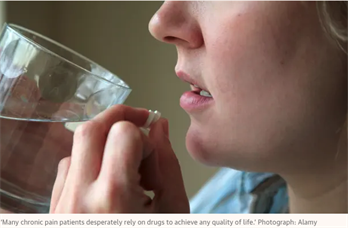Taking painkillers away from those in desperate need is a cruel health policy
Nice’s new guidelines prescribing exercise over drugs for chronic sufferers risk causing more distress
11 Apr 2021Perhaps it was inevitable that I would develop chronic pain. Both my parents were plagued for the last 20 years of their lives with severely painful knee joints. I was determined not to end up like them. I kept fit, and as a junior doctor conducted research into the molecular neurobiology of pain. But after a walking trip in the Lake District, I noticed an ominous burning sensation in my knees.

I carried on with these walking trips, but the pain continued to flare up. Thankfully, it would disappear overnight. But in my early 50s – while directing the pain clinic at Addenbrooke’s hospital in Cambridge, and then at the West Suffolk – this knee pain became steadily worse. I wore spongy trainers all the time, but the pain increased, leading to swollen knees, an inability to deal with stairs, inactivity and eventual weight gain – and yet more pain. Like many, I avoided seeing my GP.
The National Institute for Health and Care Excellence (Nice) released new guidelines on chronic pain on Wednesday, recommending sufferers of chronic primary pain – pain for which there is no clear explanation, such as arthritis or nerve damage – take exercise instead of painkillers.
The logic here seems clear. We know that some pain-relieving drugs such as opioids and gabapentinoids don’t work that well for chronic pain, but are perversely associated with higher rates of addiction and the chance of overdosing and dying. This risk seems to be highest in those who are anxious or depressed, the same individuals who are least resilient to pain. Instead, for such central pain processes, Nice suggests treatment with antidepressants, talking therapies, exercise and acupuncture.
Yet despite Nice’s good intentions, I fear a foreseeable consequence of this new guidance will be the increased suffering of chronic pain patients with the indiscriminate withdrawal of powerful analgesics from many chronic pain patients by NHS commissioners.
Share this on: